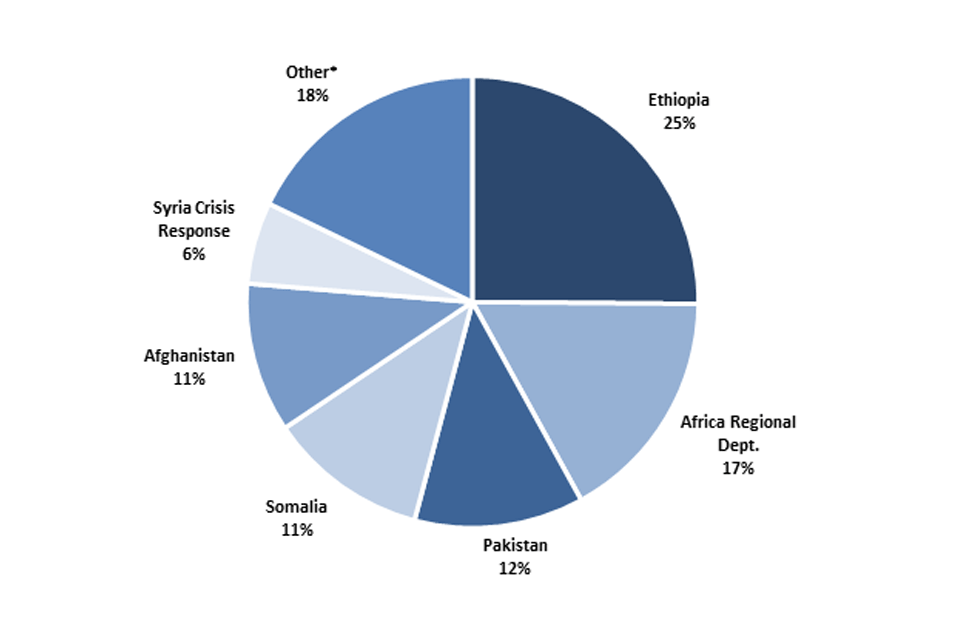DFID Annual Report and Accounts 2014 to 2015 Results: Humanitarian assistance
Published 16 July 2015
DFID leads the UK government’s response to humanitarian emergencies throughout the world, responding rapidly and decisively to save lives.
The Humanitarian Emergency Response Review (HERR) recommended how the UK could better deliver a response fit to deal with the challenges of the 21st century, based around seven key themes: Anticipation, Resilience, Leadership, Innovation, Accountability, Partnership and Humanitarian space. DFID continues to improve and reinforce the UK response to humanitarian emergencies, in line with the recommendations of the HERR.
1. DFID commitment
By its nature, humanitarian assistance is reactive to unplanned events; therefore DFID has no specific targets for the amount of humanitarian assistance to be delivered. Instead, DFID focuses on delivering the best possible humanitarian assistance to people in need.
2. Indicators used to measure progress
There is one humanitarian assistance indicator included in the DFID Results Framework:
- number of people reached with emergency food assistance through DFID support.
3. Results achieved
By the end of 2014–15, DFID had achieved the following:
- reached over 13 million people with emergency food assistance
In addition:
- the Syria Crisis Response has helped over 1.3 million people find access to clean drinking water sources
- more than 4 million women and young children have been reached by DFID’s nutrition programmes in Ethiopia
- as well as protracted crises, DFID have provided humanitarian aid in response to natural disasters such as Typhoon Hagupit in the Philippines and Cyclone Pam in Vanuatu
- in Sierra Leone, DFID is providing medical support to over 12,000 people confirmed or suspected to have contracted Ebola
4. Progress towards DFID results commitments
Results achieved up to 2014-15 inclusive
| Indicator | Indicator type | Commitment | Male | Female | Not Identified | Total |
|---|---|---|---|---|---|---|
| Number of people reached with emergency food assistance through DFID support | Cumulative | No specific target | 5,900,000 | 5,520,000 | 1,620,000 | 13,050,000 |
5. Results achieved by country/department
The highest numbers of people have been reached through programmes in Ethiopia (3.2 million), Pakistan (1.5 million), Somalia (1.5 million) and Afghanistan (1.4 million). Programmes running in multiple African countries (Africa Regional Department) have reached a further 2.2 million people.
5.1 Number of people reached with emergency food assistance through DFID support (by country/department)

Number of people reached with emergency food assistance through DFID support (by country/department)
6. Results achieved by multilateral organisations
The following results are delivered by multilateral organisations’ humanitarian assistance projects. These indicators were included in the multilateral section of DFID’s Results Framework. The results presented here are based on all funding that the multilateral receives, not just funding from DFID or the UK. These results are presented alongside DFID’s share of core funding to the multilateral organisations, in order to illustrate that DFID contributes a share of those results. Multilateral abbreviations and results sources can be found in the results technical notes.
| Indicator | Multilateral | Reporting period | Latest Results | DFID’s contribution as a % of total core funding[footnote 1] |
|---|---|---|---|---|
| Number of people benefiting from disaster preparedness activities | ECHO | 2013 | 18,000,000 | 15 |
| Number of people provided with humanitarian assistance | ECHO | 2013 | 124,000,000 | 15 |
| Number of civilians provided with essential household items | ICRC | 2014 | 3,466,000 | 16 |
| Number of detainees visited | ICRC | 2014 | 756,000 | 16 |
| Number of migrants, internally displaced persons, refugees and other vulnerable groups receiving emergency, migration and durable support (e.g shelter) | IOM | 2013 | 15,000,000 | 7 |
| Number of displaced people (refugees and internally displaced people) receiving protection or assistance | UNHCR | 2014 | 42,900,000 | 13 |
| Number of severely malnourished children aged 6-59 months reached with therapeutic feeding programmes | UNICEF | 2014 | 2,300,000 | 6 |
-
The DFID burden share presented here are not suitable to calculate a DFID results attribution of multilateral results. The results presented in this table are achieved through all funding streams that the multilateral receive, not just limited to core funding. ↩
